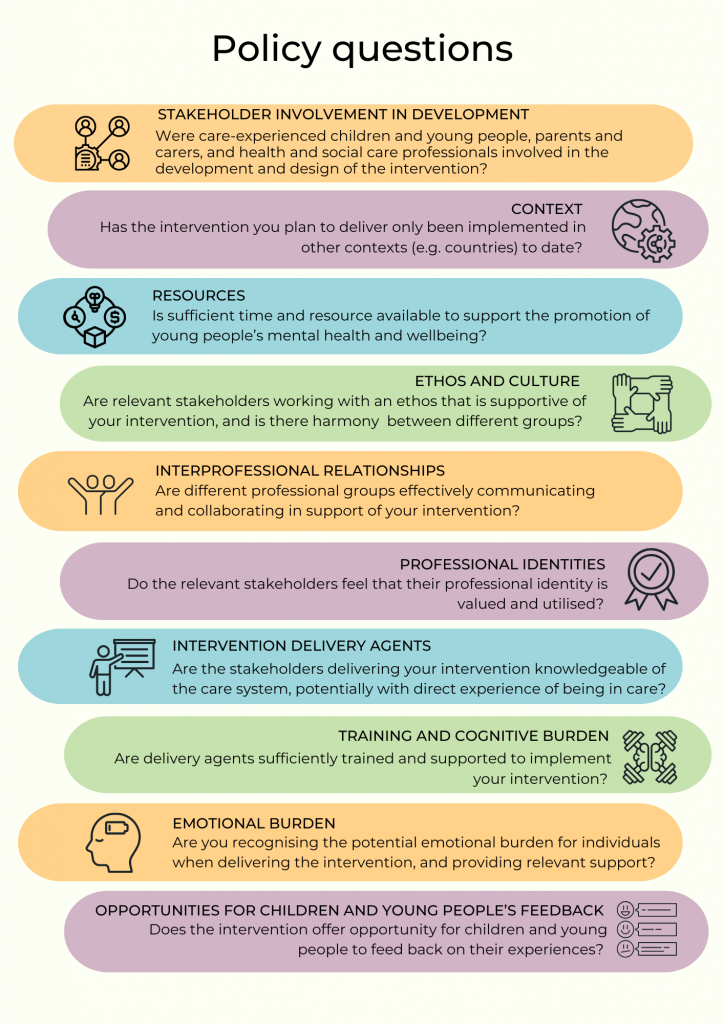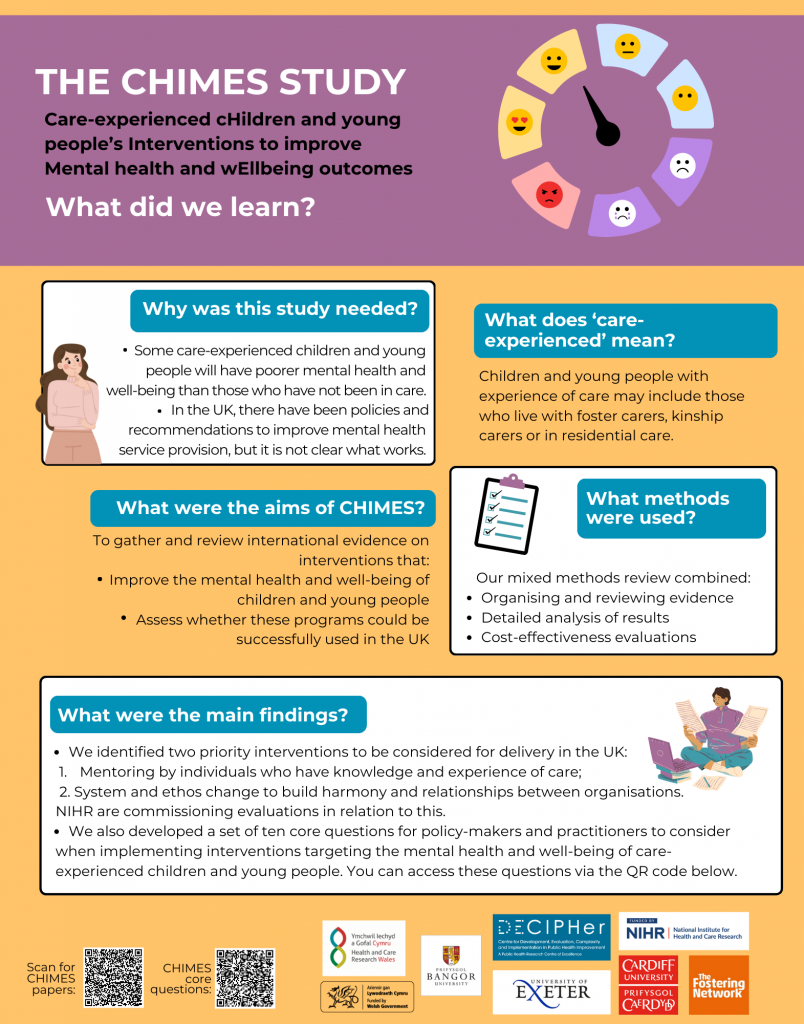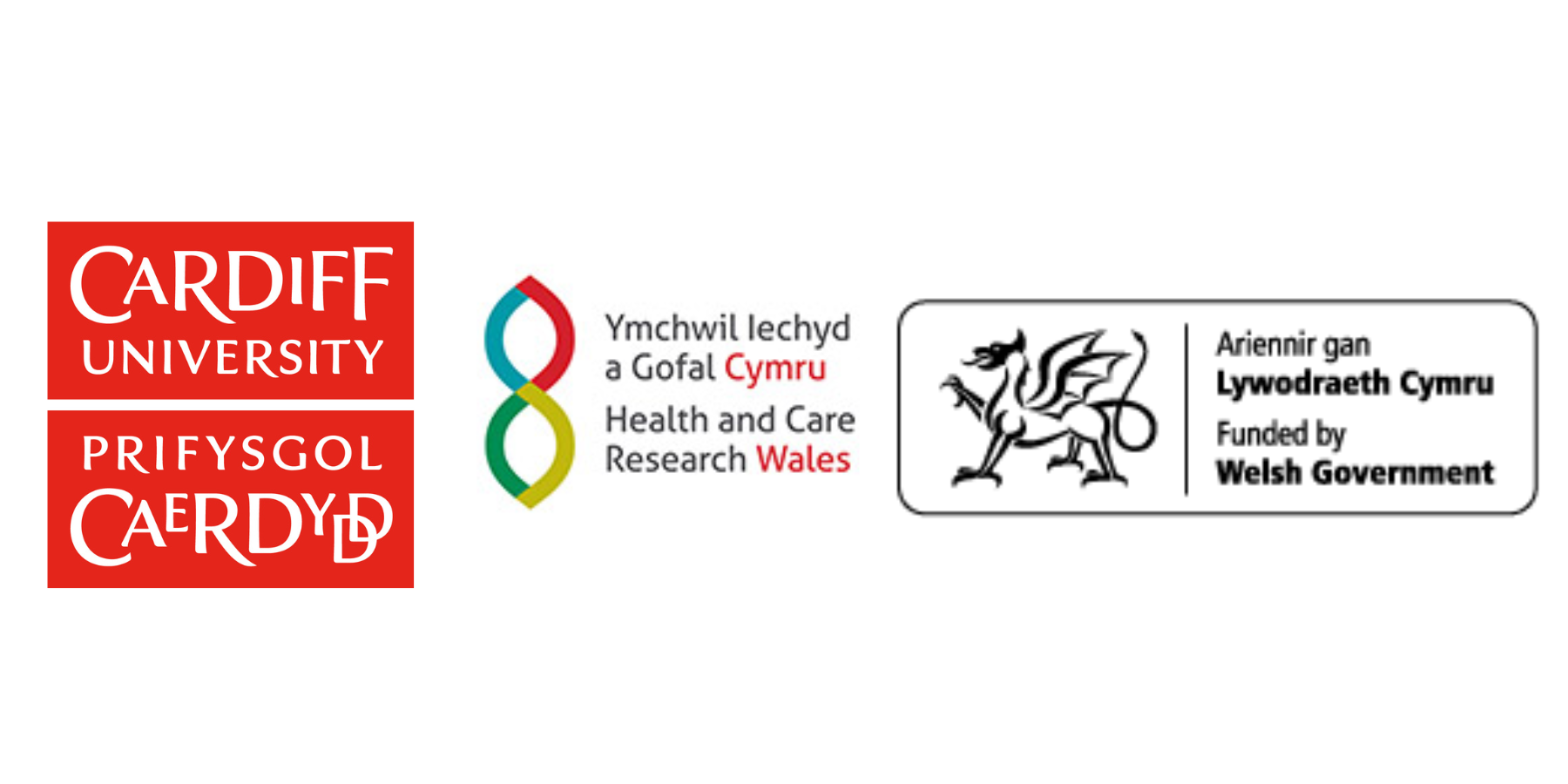
Charlotte Wooders and Sarah MacDonald provide an overview of findings from the DECIPHer-led CHIMES study. CHIMES was funded by the National Institute for Health and Care Research (NIHR) and included researchers from the University of Exeter and Bangor University.

Why was the study needed?
Children and young people with experience of care (including foster care, kinship care, and residential care) face higher risks of poorer mental health compared to their peers who do not experience care.
In the UK, there have been various policies and recommendations to support and improve mental health, but it is unclear what works effectively. Therefore this study was required to review all international research to explore what works best, and assess if these approaches could be adapted and applied in the UK. CHIMES stands for Care-experienced cHildren and young people’s Interventions to improve Mental health and wEll-being outcomes Systematic review.
What was the aim of CHIMES?
The CHIMES systematic review aimed to synthesise international evidence on interventions that improve the mental health and well-being of care-experienced children and young people. The study also sought to assess whether these interventions could be effectively implemented in the UK, considering international differences in health and social care systems.
What methods were used?
We conducted a mixed-methods review, combining systematic evidence mapping with detailed synthesis of outcome, process, and economic evaluations. We reviewed studies from 16 electronic databases and consulted experts to gather comprehensive data. We also conducted stakeholder consultations to consider if the interventions could be used in the UK.
What were the main findings?
The study identified 64 interventions. Most were from the USA and focused on improving young people’s social and emotional skills, or changing foster carers’ parenting styles. We did not find much research looking at the impact on children and young people’s well-being, self-harm or suicide. While some short-term improvements in mental health were seen, the longer-term impacts were less clear. It is not clear if these approaches are more cost-effective than current services.
We also considered some of the challenges to delivering programmes. Key issues were an inadequate time and resource for supporting mental health, difficulties in coordinating healthcare and social care services, and lack of consultation with young people to identify how their needs should be met.
Sarah MacDonald led the review of process evaluations and said: ‘We drew out several factors that future interventions should focus on in order to help improve implementation and acceptability. Importantly, developers should look to co-produce interventions with stakeholders and potential participants, as they can bring powerful voices about the lived experience of care.’
How did you involve stakeholders in the review?
After synthesising the main findings we presented them to a range of stakeholders including: care-experienced young people, foster carers, health and social care practitioners and government representatives. The Fostering Network and CASCADE Voices helped us with stakeholder engagement.
Charlotte Wooders supported stakeholder engagement on the study, and commented: ‘It was extremely valuable to have stakeholder input as part of the review process, and to talk through some of the realities of interventions that seem to work well in other social care systems. In particular, foster carers commented on the different languages, styles and parenting practices in the US compared to the UK, and how this needs to be kept in mind when planning future interventions.’
What’s next?
We identified two priority interventions to be considered for delivery in the UK: (1) mentoring by individuals with knowledge and experience of care and (2) system and ethos change to create harmonisation between organisations and facilitate interprofessional relationships. NIHR are commissioning evaluations in relation to this.
We also developed a set of 10 core questions for policy-makers and practitioners to consider when implementing interventions targeting the mental health and well-being of care-experienced children and young people. These covered: stakeholder involvement; context, resources and ethos; and opportunities for children and young people to feed back on their experiences. The questions can be viewed below or downloaded here: CHIMES – Policy Questions poster. A project summary poster can also be viewed below or downloaded here: CHIMES – Summary Poster.


Note on blog authors
Charlotte Wooders is the School Health Research Network (SHRN) Engagement Manager.
Sarah MacDonald is a Research Fellow in DECIPHer, and undertakes qualitative research, with a focus on school-based well-being for children and young people.
Publications
Monograph:
Evans R, MacDonald S, Trubey R, Noyes J, Robling M, Willis S, et al. Interventions to improve mental health and well-being in care-experienced children and young people aged less than 25: the CHIMES systematic review. Public Health Res 2024;12(14). https://doi.org/10.3310/MKYP6299
Outcome evaluations:
Trubey, R., Evans, R., McDonald, S., Noyes, J., Robling, M., Willis, S., Boffey, M., Wooders, C., Vinnicombe, S., & Melendez-Torres, G. J. (2024). Effectiveness of Mental Health and Wellbeing Interventions for Children and Young People in Foster, Kinship, and Residential Care: Systematic Review and Meta-Analysis. Trauma, Violence, & Abuse, 25(4), 2829-2844. https://doi.org/10.1177/15248380241227987
Process evaluations:
MacDonald, S., Trubey, R., Noyes, J., Vinnicombe, S., Morgan, H.E., Willis, S., Boffey, M., Melendez-Torres, G.J., Robling, M., Wooder, C., and Evans, R. (2024). Mental health and wellbeing interventions for care-experienced children and young people: Systematic review and synthesis of process evaluations. Children and Youth Services Review 156, article number: 107266. https://doi.org/10.1016/j.childyouth.2023.107266
Equity harms:
Evans, R., Trubey, R., MacDonald, S. , Noyes, J., Robling, M., Willis, S., Boffey, M., Wooders, C., and Melendez-Torres, G. J. (2024) What Mental Health and Wellbeing Interventions Work for Which Children and Young People in Care? Systematic Review of Potential Outcome Inequities. Child & Adolescent Social Work Journal. https://doi.org/10.1007/s10560-023-00956-7
Evidence map:
Evans, R.. MacDonald, S., Trubey, R., Noyes, J., Robling, M., Willis, S., Boffey, M., Wooders, C., Vinnicombe, S., and Melendez-Torres, G. J. (2023). Interventions targeting the mental health and wellbeing of care-experienced children and young people in higher-income countries: Evidence map and systematic review. Systematic Reviews 12(1), article number: 111. https://doi.org/10.1186/s13643-023-02260-y
Protocol:
Evans, R., Boffey, M., MacDonald, S., Noyes, J., Melendez-Torres, G.J., Morgan, H.E., Trubey, R., Robling, M., Willis, S. and Wooders, C. (2021). Care-experienced cHildren and young people’s Interventions to improve Mental health and wEll-being outcomes: Systematic review (CHIMES) protocol. BMJ Open 11(1), article number: e042815. http://dx.doi.org/10.1136/bmjopen-2020-042815
Funders
This work was supported by the NIHR-PHR grant number NIHR129113. This work was supported by The Centre for Development, Evaluation, Complexity and Implementation in Public Health Improvement (DECIPHer) funded by Welsh Government through Health and Care Research Wales. The Centre for Trials Research receives funding from Health and Care Research Wales and Cancer Research UK.
Lead Investigator
Rhiannon Evans, DECIPHer, Cardiff University.
Co-Investigators
Sarah MacDonald, DECIPHer, Cardiff University.
Robert Trubey, Centre for Trials Research, Cardiff University.
Jane Noyes, School of Medical and Health Sciences, Bangor University
Michael Robling, Centre for Trials Research, Cardiff University.
Simone Willis, Specialist Unit for Review Evidence, Cardiff University
Soo Vinnicombe, School of Medical and Health Sciences, Bangor University,
Maria Boffey, SHRN, DECIPHer, Cardiff University.
Charlotte Wooders, SHRN, DECIPHer, Cardiff University.
Asmaa El-Banna, University of Warwick.
GJ Melendez-Torres, Peninsula Technology Assessment Group (PenTAG), University of Exeter.




